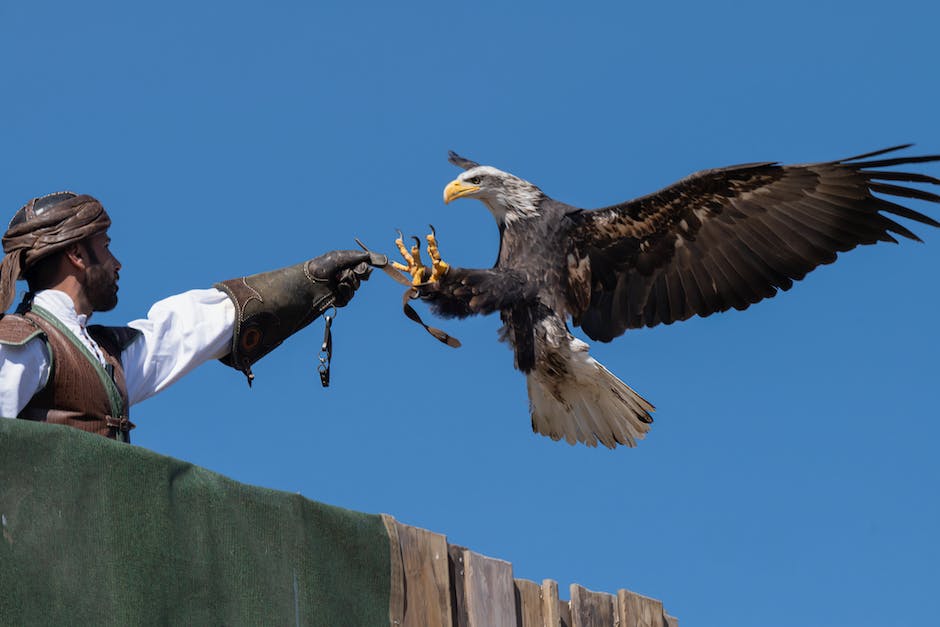Table of Contents
Unleashing the Power of Falconry: Inspiring Leadership through Ancient Traditions.
Introduction
Falconry in the Arab World: Drawing Parallels to Leadership Vision
Falconry has a rich history in the Arab world, dating back centuries. It is not only a traditional sport but also a symbol of power, prestige, and leadership. This ancient practice of training and hunting with falcons holds valuable lessons that can be applied to leadership vision. By examining the principles and techniques of falconry, we can draw parallels to effective leadership and gain insights into the qualities and skills required to lead with vision in the Arab world.
The Historical Significance of Falconry in the Arab World

Falconry, the art of training and hunting with falcons, has a long and rich history in the Arab world. This ancient practice dates back thousands of years and holds great cultural significance in the region. Falconry was not only a means of survival but also a symbol of power and prestige. The historical significance of falconry in the Arab world can be seen in its connection to leadership vision.
In ancient times, falconry was a vital skill for survival in the harsh desert environment. Bedouin tribes relied on falcons to hunt for food, as these birds were able to catch elusive prey such as hares and gazelles. The ability to train and control these magnificent creatures was a testament to the skill and resourcefulness of the falconer. It required patience, dedication, and a deep understanding of the bird’s behavior.
As the Arab world evolved, so did the role of falconry. It became more than just a means of survival; it became a symbol of power and prestige. Falcons were highly prized and were often given as gifts between rulers and nobles. The possession of a well-trained falcon was a sign of wealth and influence. It demonstrated the owner’s ability to command not only the bird but also the respect of others.
The historical significance of falconry in the Arab world can be seen in its connection to leadership vision. Just as a falconer must have a clear vision of what they want their falcon to achieve, a leader must have a clear vision of their goals and objectives. A falconer must train their bird to be disciplined, focused, and obedient. Similarly, a leader must inspire and guide their team towards a common goal.
Falconry also teaches us the importance of patience and perseverance. Training a falcon is a time-consuming process that requires consistent effort and dedication. It is not something that can be rushed or forced. Similarly, leadership requires patience and the ability to navigate through challenges and setbacks. A leader must be willing to put in the time and effort to develop their team and achieve their vision.
Furthermore, falconry emphasizes the importance of trust and mutual respect. A falconer must build a strong bond with their bird based on trust and respect. The falcon must trust that the falconer will provide for its needs and protect it from harm. In return, the falconer must respect the bird’s instincts and allow it the freedom to fly and hunt. This mutual trust and respect are also essential in leadership. A leader must trust their team to carry out their responsibilities and make decisions, while the team must trust the leader’s guidance and support.
In conclusion, the historical significance of falconry in the Arab world goes beyond its practical use as a hunting technique. It is a symbol of power, prestige, and leadership. Falconry teaches us valuable lessons about vision, patience, perseverance, trust, and respect. These lessons can be applied to leadership in any context, reminding us of the timeless wisdom that can be found in ancient practices.
Falconry as a Symbol of Leadership in Arab Culture
Falconry has a long and rich history in the Arab world, dating back thousands of years. It is not only a popular sport and pastime, but also a symbol of leadership and vision in Arab culture. The art of falconry involves training and hunting with falcons, and it requires a deep understanding of the birds and their behavior. In many ways, the skills and qualities needed to be a successful falconer mirror those required of a strong leader.
In Arab culture, falconry has long been associated with nobility and power. The falcon is seen as a majestic and regal bird, and its ability to soar through the sky with grace and precision is admired by many. This symbolism is not lost on Arab leaders, who often strive to embody the same qualities of strength, grace, and precision in their own leadership styles.
One of the key aspects of falconry is the bond between the falconer and the bird. A successful falconer must develop a deep understanding of the falcon’s behavior and needs, and must be able to communicate effectively with the bird. This requires patience, empathy, and a keen sense of observation. Similarly, a strong leader must be able to understand and connect with their team members, and must be able to effectively communicate their vision and goals.
Another important aspect of falconry is the training process. Falcons are not naturally inclined to hunt for humans, so they must be trained to do so. This requires a great deal of time, effort, and skill on the part of the falconer. The training process involves building trust and establishing a strong bond between the falcon and the falconer. This process can be challenging and requires a great deal of patience and perseverance. Similarly, a strong leader must be able to inspire and motivate their team members, and must be willing to put in the time and effort required to help them develop their skills and reach their full potential.
In addition to the training process, falconry also requires a great deal of strategy and planning. A successful falconer must be able to anticipate the movements of their prey and plan their hunting strategy accordingly. They must also be able to adapt to changing circumstances and make split-second decisions in the heat of the moment. This ability to think quickly and strategically is also a crucial skill for a strong leader. They must be able to analyze complex situations, make informed decisions, and adapt their plans as needed.
Overall, falconry serves as a powerful symbol of leadership in Arab culture. The qualities and skills required to be a successful falconer mirror those needed to be a strong and effective leader. From the deep understanding of the birds and their behavior, to the ability to build trust and establish a strong bond, to the strategic thinking and planning, falconry offers valuable lessons for leaders in the Arab world and beyond. By drawing parallels to falconry, leaders can gain a deeper understanding of what it takes to inspire and motivate their teams, and can strive to embody the same qualities of strength, grace, and precision that are admired in the majestic falcon.
Drawing Parallels between Falconry and Visionary Leadership
Falconry, an ancient practice that dates back thousands of years, has deep roots in the Arab world. This traditional sport involves training and hunting with falcons, and it has long been associated with nobility and prestige. However, beyond its cultural significance, falconry also offers valuable insights into visionary leadership.
One of the key aspects of falconry is the bond between the falconer and the falcon. This relationship is built on trust, respect, and mutual understanding. Similarly, visionary leaders understand the importance of building strong relationships with their team members. They recognize that trust and respect are essential for fostering a collaborative and productive work environment.
In falconry, the falconer must have a clear vision and a strategic plan to guide the training process. They must understand the unique characteristics and abilities of each falcon and tailor their approach accordingly. Similarly, visionary leaders have a clear vision for their organization and develop strategic plans to achieve their goals. They understand the strengths and weaknesses of their team members and leverage them effectively to drive success.
Another parallel between falconry and visionary leadership is the need for patience and perseverance. Training a falcon is a time-consuming and challenging process that requires consistent effort and dedication. Falconers understand that progress may be slow, but they remain committed to their goal. Likewise, visionary leaders understand that achieving their vision takes time and effort. They are not deterred by setbacks or obstacles but instead use them as opportunities for growth and learning.
Furthermore, falconry teaches us the importance of adaptability and flexibility. Falcons are intelligent creatures that can quickly adapt to changing circumstances. Falconers must be able to adjust their training methods and strategies based on the falcon’s behavior and response. Similarly, visionary leaders must be adaptable and flexible in their approach. They understand that the business landscape is constantly evolving, and they are willing to embrace change and adapt their strategies accordingly.
In addition to these parallels, falconry also emphasizes the importance of observation and intuition. Falconers carefully observe their falcons’ behavior and body language to understand their needs and emotions. They rely on their intuition to make decisions and adjust their training techniques. Similarly, visionary leaders are keen observers who pay attention to the needs and concerns of their team members. They trust their intuition and make informed decisions based on their observations.
In conclusion, falconry in the Arab world offers valuable insights into visionary leadership. The bond between the falconer and the falcon, the need for a clear vision and strategic planning, the importance of patience and perseverance, adaptability and flexibility, and the significance of observation and intuition are all key aspects that can be applied to leadership. By drawing parallels between falconry and visionary leadership, we can gain a deeper understanding of what it takes to be an effective leader. Just as falconers nurture and guide their falcons, visionary leaders inspire and empower their teams to achieve greatness.
Lessons in Leadership from Falconry in the Arab World
Falconry, an ancient practice of training birds of prey to hunt, has a long and storied history in the Arab world. For centuries, falconry has been not only a means of sustenance but also a symbol of power and prestige. In recent years, scholars and business leaders have drawn parallels between the art of falconry and effective leadership, particularly in the Arab world. This article explores the lessons in leadership that can be learned from falconry in the Arab world.
One of the key lessons that falconry teaches us about leadership is the importance of vision. In falconry, a falconer must have a clear vision of the desired outcome – catching the prey. Similarly, a leader must have a clear vision of where they want to take their organization or team. This vision serves as a guiding light, providing direction and purpose. Without a clear vision, a leader risks losing focus and direction, leading to a lack of motivation and productivity among their followers.
Another lesson that can be learned from falconry is the importance of patience and perseverance. Falconry is not a quick and easy process. It requires hours of training, building trust, and developing a strong bond between the falconer and the bird. Similarly, effective leadership requires patience and perseverance. A leader must be willing to put in the time and effort to develop their team, build trust, and overcome obstacles. It is through this patience and perseverance that a leader can achieve long-term success.
Furthermore, falconry teaches us about the importance of adaptability. In falconry, a falconer must adapt their training techniques to suit the individual bird’s needs and abilities. Similarly, a leader must be adaptable and flexible in their approach. They must be able to assess the strengths and weaknesses of their team members and adjust their leadership style accordingly. By being adaptable, a leader can maximize the potential of their team and achieve greater success.
Additionally, falconry teaches us about the importance of trust and communication. In falconry, a falconer must build a strong bond of trust with their bird. This trust is built through consistent training, positive reinforcement, and effective communication. Similarly, a leader must build trust with their team members. They must communicate openly and honestly, provide feedback and support, and empower their team to make decisions. By building trust and fostering open communication, a leader can create a positive and productive work environment.
Lastly, falconry teaches us about the importance of respect and humility. In falconry, a falconer must respect the bird’s natural instincts and abilities. They must recognize that they are working with a powerful and majestic creature. Similarly, a leader must respect the skills and abilities of their team members. They must recognize that each individual brings unique talents and perspectives to the table. By showing respect and humility, a leader can create a culture of collaboration and mutual respect, leading to increased engagement and loyalty among their team members.
In conclusion, falconry in the Arab world offers valuable lessons in leadership. From the importance of vision and perseverance to adaptability and trust, falconry teaches us about the qualities and skills that make an effective leader. By drawing parallels between falconry and leadership, we can gain insights into how to become better leaders in our own organizations and teams. So, let us take inspiration from the ancient art of falconry and soar to new heights in our leadership journeys.
Q&A
1. What is falconry?
Falconry is a traditional hunting method that involves training and using falcons or other birds of prey to catch game.
2. How is falconry practiced in the Arab world?
Falconry has a long history in the Arab world and is considered a significant cultural practice. It involves training and flying falcons to hunt small game, such as hares or birds, in desert or open areas.
3. What parallels can be drawn between falconry and leadership vision?
Falconry and leadership vision share similarities in terms of strategy, focus, and the ability to adapt to changing circumstances. Both require a clear vision, patience, and the ability to guide and empower others towards a common goal.
4. Why is falconry significant in the Arab world?
Falconry holds cultural and historical significance in the Arab world, representing a connection to the region’s heritage and traditions. It is also seen as a symbol of power, prestige, and skill, reflecting the values and aspirations of Arab societies.
Conclusion
In conclusion, falconry in the Arab world provides valuable insights into leadership vision. The practice of training and hunting with falcons requires a strong vision, patience, and the ability to adapt to changing circumstances. Similarly, effective leaders must have a clear vision, be able to navigate challenges, and adapt their strategies to achieve success. By drawing parallels between falconry and leadership, we can gain a deeper understanding of the qualities and skills required for effective leadership in the Arab world and beyond.





Recent Comments